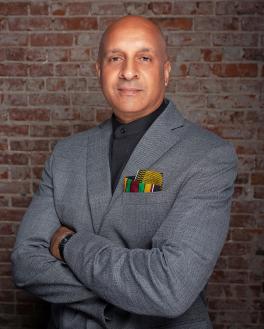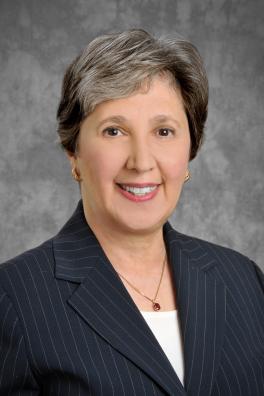The Department of Sociology is incredibly fortunate to benefit from the expertise of a highly engaged advisory board of alumni and supporters. Below, you'll learn more about two members of this vital board.
Vince Duncan, Chair of the Advisory Board

When did you join the board, and why?
I joined the board in spring 2020. I was invited to have a discussion about the role of the advisory board and its relationship with the Department of Sociology. What really struck me was the added element of mentoring current undergraduate students majoring in sociology/criminology. This is extremely important to me because it gives me and the other board members the opportunity to have a profound impact on students regarding assisting them with a range of tasks that include mock interviewing for employment to preparation for graduate school and sharing our career paths and life experiences that were guided by our academic endeavors in sociology. In my opinion, mentoring can be especially beneficial to students who are not from central Ohio and definitely those who have migrated to the United States from other countries. It can be a very daunting task to navigate a large university in a country that is not in one’s homeland.
Why did you choose to accept the position as chair of the Sociology Alumni Advisory Board?
When I was asked to become chair, I didn’t hesitate for one second to accept this opportunity. I consider my board membership to be an honor and to be chair is the highest honor and very humbling. While I’ve previously been a member of other civic and community boards, I am by far the most passionate about the Sociology Advisory Board, and I consider it to be an enormous honor to chair this board. I want our board to have a sincere and meaningful impact on the department.
What do you see the board’s role as?
Our board provides philanthropic support, and we consider ourselves to be a sounding board to the department chair and faculty and give assistance and insight when and where needed. Our involvement gives us the opportunity to propose, create and advance the goals and initiatives of the department.
What are the board’s future plans?
We have ambitious plans to create endowment funds and scholarships to increase our chances of attracting the brightest students and faculty and more importantly, retain the students and faculty we currently have. The advisory board aspires to connect with sociology/criminology alumni and community partners to seek their guidance and volunteerism where needed. We want these individuals to be engaged with the department and provide them with the opportunity to “give back” and “give forward” to help us and the department to reach our goals. In addition to living in a diverse society, we live in a very competitive society as well. We must do everything we can to continue our research efforts and increase our chances of understanding our societal similarities and differences, which will give us a better chance of living productively and peacefully with each other.
When were you at Ohio State?
I attended Columbus State Community College in the 1990s before transferring to Ohio State in the fall of 2000. I graduated with a sociology degree in December 2001. Attending Ohio State was a no-brainer for me. I grew up knowing nothing but Ohio State. My father earned his undergraduate degree in education and after a four-year stint in the U.S. Army, he returned to Ohio State to earn his law degree. My younger sister earned her master’s degree in Ohio State’s College of Education.
What is your favorite memory from your time at Ohio State?
I can’t narrow my answer to one memory. My favorite memories are connected to several professors and the courses they taught. The most intriguing course was Sociological Theory, taught by Dr. Basil Kardaras, in the basement of University Hall. It was winter quarter 2001, cold and snowy, and the ambiance of University Hall added to the intrigue. The most eye-opening class was Contemporary World Societies: Social Institutions and Social Change, taught by Dr. Donna Crossman, who was a very enthusiastic and engaging professor. The most energetic and interesting professor was Dr. Townsand Price-Spratlen, he taught Types of Sociological Inquiry. When I say he was energetic, you better believe me! And he still is! Dr. Price-Spratlen is a great instructor, very engaging, and a captivating conversationalist. Lastly, I was a student of Dr. Brenda Chaney, in Sociology of Education. Dr. Chaney was very interested in encouraging her students to be actively involved in class discussions. Her generous support and dedication played an enormous role in my achievement of earning a BA in sociology.
How has your background in sociology impacted your career and how you move about the world?
The world of sociology enhanced and stoked a curiosity that I already had regarding people and experiences who are different from me and my life experiences. I currently work in the real estate industry and if you ask anyone who knows me well, they’ll tell you I always mention the clients I’ve met who are from other countries, especially some of those that comprise West Africa. An agent/client relationship oftentimes progresses to a friendship that includes invitations to their homes for social gatherings and sharing meals. Learning about people from different countries and cultures has a direct impact on the type of housing they desire and maybe more importantly, where they wish to live. This is a constant topic of conversation I have with other real estate agents so they can be prepared if they meet clients from different countries.
Is there anything in particular that you learned from your time as a sociology student that really stuck with you?
When I began enrolling in the advanced-level sociology courses, I was able to tie answers together with previous questions I had about various groups of people and the social institutions that shape our lives in society. Some of the answers are outcomes that may not be what we desire but those outcomes may serve as a beacon to lead us in a direction that hopefully will result in a more common good.
What is your favorite part of being on the board?
Several answers: I enjoy walking across campus and seeing students milling about, going to and from class. I sincerely enjoy my participation on the board, hoping that I have a positive impact on the sociology department, no matter how big or small. Lastly, it’s all about the students. Ultimately, the mentoring. Giving advice, sharing ideas, listening to them, learning from them.

Toby Parcel, Professor Emerita, Department of Sociology and Anthropology, North Carolina State University
When were you at Ohio State, and in what capacity?
I joined the Ohio State Department of Sociology in July 1984 as an associate professor. Later I was promoted to full professor and served as an associate dean in the College of Social and Behavioral Sciences. After that, I served as Chair of the Department of Sociology until 2002.
As you reflect back on your time at Ohio State, can you share a favorite memory?
I have so many favorite memories that it is impossible to choose just one. Certainly, I valued my research partnerships with other sociology faculty including William Form, Michael Wallace and Bob Kaufman, with whom I studied work arrangements in the context of technological change. After that, I formed a very fruitful research partnership with Elizabeth Menaghan. We studied the effects of parental work on child outcomes.
A second favorite memory would be teaching and mentoring graduate students to facilitate their transformation from talented undergraduates to professional sociologists. One student, Mikaela Dufur, has continued to be a valued colleague long after her graduation, and has gone on to be a terrific teacher and researcher, as well as an administrator.
Finally, another favorite memory would have to be the opportunity I had to support other faculty in achieving research success. This was a central activity for me while I was an associate dean as well as when I was department chair.
What has the course of your career looked like?
I am grateful to faculty at both my undergraduate and graduate institutions who nurtured my interest in sociology and encouraged me to pursue a career in research. I was fortunate to have strong faculty mentors in my first teaching job out of graduate school, as well as at Ohio State. It was at Ohio State, however, that I discovered my interest in administration, which I pursued even after I left. I valued my opportunities to help shape the directions of several liberal arts departments as Dean of Liberal Arts at Purdue and North Carolina State Universities, as well as to financially support sociologists from all over the United States as I concluded my career as Program Director for Sociology at the National Science Foundation.
What are you most proud of in your career?
I am proud of helping a broad range of faculty pursue important research agendas, and of mentoring graduate students who have excelled in their chosen careers.
What motivated your philanthropic support to the department and your joining of the Sociology Advisory Board?
I have been associated with several strong universities over the years and am grateful to each. But I believe that Ohio State did the most for me in my career, and offered an abundance of opportunities for me to develop as a professional in my field. I wanted to give back to the department around which this development was centered, and provide some support for faculty coming along in the future as I was able to do in the past. For this reason my husband, John Gerber, and I established the Parcel-Gerber Faculty Research Support Fund to provide seed money to support sociology faculty in the early stages of research projects. We believe these investments will yield important dividends for their future research, as well as for their graduate mentoring and undergraduate teaching. Serving on the Sociology Advisory Board has been very inspirational because I have met so many former alumni who share my loyalty and enthusiasm.
What advice would you offer to current Department of Sociology students?
I would advise current students to take advantage of the many opportunities our department provides, both in the classroom and beyond. Find some mentors who can facilitate your journey, and choose the path that is right for you after graduation. Know that the skills you are building will pay off in a myriad of ways as you pursue your careers.
